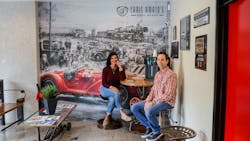If you surf on over to the website for Chris Amato’s Body Werks, you’ll find the word “luxury” scattered about. You could also easily infer that from the badges scrolling past, representing the OEM certifications the shop holds—Porsche, Lucid, BMW and more. But lest you think this is a shop born with a silver spoon in its mouth, think again. It wasn’t always that way. And it makes the shop’s 10-year anniversary this year all that more special to its owners.
“When we took the shop over in 2013, it had minimal equipment, it was only 10,000 square feet. We were painting coolers,” says Lisa Collins, Amato’s partner in life as well as in their Oceanside, California, shop.
Those early challenges were the expected growing pains of any new business, certainly nothing to do with a lack of experience or knowledge. Amato is the product of many fine influences in collision repair, starting with his father, who began his career as a body man in a Cadillac dealership in the 1950s. That example instilled a love of cars in his four sons, with Amato’s oldest brother Paul eventually starting his own shop.
“I was brought up in the industry, working on cars as a kid, officially started working on cars when I was 16,” Amato says. “When I was in high school, instead of playing sports, I took a job experience deal through the high school where you could get out of school early. So I used to get out of school about 1:30 and then I would run to my brother's shop and work with him.”
Chris worked as a body technician at Amato’s Auto Body for 25 years, during which time he was exposed to many of the high-end OEM certifications his own shop holds today. He then decided to strike out on his own in 2013. That meant carving out some territory of San Diego County for himself, leaving the south for Amato’s shop in Sorrento Valley and setting up for himself straight up Interstate 5 in the North County beach community of Oceanside.
“I tried to get as kind of far away from him as possible just so that we could separate a little bit,” says Chris.
From Box Trucks to Benzes
Watching his brother’s flourishing shop was certainly a great example for when Amato started his own shop, and he certainly had all the knowledge necessary from a quarter-century spent in collision repair. But starting any new business is never easy, and Amato and Collins--who was new to the industry--had their share of growing pains early on. They took over an existing shop, which had some built-in advantages but was not optimized for the high-volume, high-end business Amato wanted to build.
“There were only four technicians here and no office staff at all, and $50,000 was considered a good month,” recalls Collins. “So, it was scary.”
There were few high-end vehicles back then, Amato recalls. The shop would work on anything that came through the door. One boost that came built in was the relationship the previous shop had with the United States Marine Corps and its Camp Pendleton base located in northern Oceanside. The Marine Corps brought in an influx of box trucks, trailers, heavy equipment, cars from its fleet of vehicles and more. The shop did every bit of work it could get its hands on from the Marine Corps, Amato said.
That business provided a steady stream of work for the first three or four years of the shop’s operation. But still those early years were difficult as the shop found its footing. Amato had the collision shop expertise and Collins had a business background but there were aspects of this new venture that were new to each of them, and both felt the weight of the risk personally and professionally.
“It was scary for probably about a year and a half, really scary,” says Amato. “Where we were, you know, I came from a shop that was super high [volume]. And so when I opened this, I had to basically reinvent myself, because any work that we took in was good work, where before it was we'd walk outside to write an estimate and the customer’s basically sold before they pulled in the parking lot. We had to scratch and claw to keep the business going and the doors open and pay everybody salaries.”
The couple also had their personal relationship to consider.
“And since we put all our eggs in one basket,” added Collins, “since we're together and working together, it was scary.”
While volume was an important metric as the shop was beginning to grow, it wasn’t the ultimate business model Amato had in mind. He wanted the top priority to be on quality repairs, and to do that he felt it was important to do two things: Pursue OEM certifications and not operate on DRPs.
A DRP model could have been a natural way for a young shop to pipe in a steady stream of cars through the doors. But it wasn’t for Amato, nor was it for his brother, who never operated on a DRP. Amato followed that same model in his own shop, believing it to be essential to prioritizing quality.
“Just produce the quality work and hopefully the name would get out there and we would get the referrals and producing the best repairs that we possibly could,” Amato says of his approach to business.
When it came to getting started on certifications, some pre-existing relationships helped. Amato had some relationships with Tesla and also some dealerships in nearby Carlsbad. Exploring these relationships helped get the shop started on its certification journey.
“We slowly started to gain traction where [the dealerships] were starting to send us, and we were producing, high quality repairs, which I was accustomed to, and slowly started getting certifications and worked our business from there,” says Amato.
By Amato’s recollection, Tesla was the first certification for the shop, which opened the door to more high-end certifications like Jaguar Land Rover and Mercedes. All the equipment necessary for the Tesla certification helped down the road with others, as well. This approach has had a downstream effect of continued business for the shop.
“We try to do really, really good quality and work with some of the dealerships that are near us,” says Amato. “So, all of our work is word of mouth, and dealer direct referrals. We do a lot of manufacturer repairs for Tesla, so we do a lot of warranty repairs.”
Maintaining a High-End Reputation
Obviously, there is no shop that sets out to not do quality repairs. But the product is often self-evident whether a shop is truly making quality a priority or not. Striving for quality first, Amato believed, would be the best way to not only compete but stand out.
“After a lot of marketing, hiring great staff and chasing certifications, we've been very blessed,” says Collins. “It's been really, really lucrative for us. And one of the things that we really focus on is quality of staff.”
While Amato is no longer in the back working on cars, he does lend his expertise to the team from a training perspective. Employees also receive extensive training through the shop’s myriad of OEM certifications. The shop also provides a host of attractive benefits to recruit and retrain the most skilled team members, such as unlimited PTO, full medical and dental coverage and a retirement plan. Technicians are also salaried instead of paid on commission, which Amato reports is a rarity in his area, if not across California.
“My belief for the years is that commission—and I was a body man—commission tends to sacrifice quality,” Amato says. “So, if you have a body man that you put on a car, and the faster he is, the more money he makes, I tend to believe that creates an issue where you skip steps. … Obviously we need technicians to produce, but I don't want cars produced over quality. If it costs us as a business a little bit more to repair the cars properly and make it undetectable that the car was ever in an accident, that would be my ultimate goal.”
Amato and Collins, who both serve on the board of the San Diego chapter of the California Autobody Association, are proud of the standard of quality they’ve been able to maintain and also that they’ve managed to remain one of “very few” independent, non-DRP shops in their part of San Diego. The shop has nearly doubled in size as the team celebrates its 10th anniversary this year, still in the same building but having acquired two additional buildings on the property. Collins says any further expansion would be at a different facility as there isn’t much more to add to the current location. Having carved out a niche where it is with a singular focus from the beginning, there is no reason to change things up now.
“I'm surrounded by body shops down here,” says Amato. “So we just don't really worry about what the other guys are doing. We just try to focus on fixing cars, right? And making the customer happy.”
About the Author
Todd Kortemeier
Todd Kortemeier is former editor of FenderBender magazine and started writing as a contributor in 2024.

